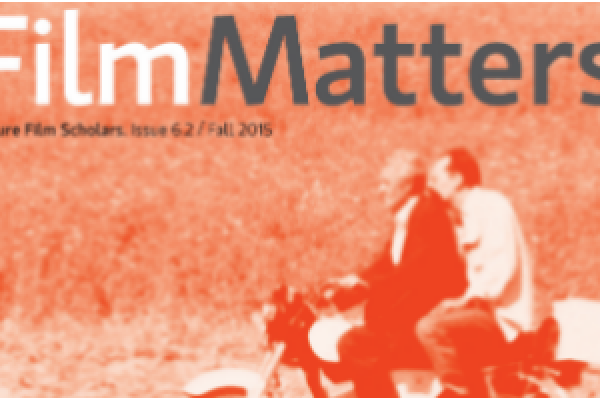Film Studies Senior Seminar Produces an Issue of Film Matters

Professor Margaret Flinn’s Film Studies senior seminar this past year took an innovative approach to engaging films and other media. Flinn, graduate student teaching apprentices and students collaborated to produce an issue of Film Matters, a journal that includes both standard scholarly articles and short featurettes (book reviews, DVD reviews, interviews, etc.). The journal issue (Volume 6, Number 2) will appear in print this winter.
In a typical Film Studies course, students regularly read articles published in scholarly journals and may get the chance to write a research paper. There is little opportunity for students to experience the process for the publication of the articles they read and connect it to their own work.
Flinn said, “Usually when dealing with assigned readings or helping students carry out their own research, professors will discuss methodology and approach, but doing double-blind peer review as a reviewer gives a very different kind of insight into types of writing, methodologies and whether an argument/approach is effective or not.”
In her Film Studies course, Flinn gave assignments focused on carrying out and evaluating research and various types of writing on film. Students reviewed each others’ work and once the final selection of works was chosen, the editors began to put together the journal itself.
Flinn wanted her students to have more than the average classroom experience; she wanted to give them a feel for the real world of reviewing and publishing, to see what goes into a scholarly publication and contribute to its content.
She said, “Students get to see the whole process, from content writing to editing and securing image rights. The people whose work was rated highest in blind peer review will see their essays appear in print--which also means they're going through things like signing publication contracts, securing image rights for illustrations and correcting proofs.”
Paige Piper, a graduate student teaching apprentice, served as an associate guest editor for the Film Matters project. As an aspiring professor of French film and visual cultures, Piper says her eyes were opened to a new method by which students can use creative and analytical skills to think about film. She believes the deconstruction of the writing and publication process brought about a visible progression in the level of students’ own writing, in the breadth of their analysis and in the scope of their ideas.
“Creating the Film Matters journal allowed the students to link their interests and their scholarship to the production of a real, tangible object that exists as proof of their labor, their learning and love of film,” Piper said. “The entire project was an amazing opportunity for the students (who made up the editorial board) to generate content in featurettes and reviews, to analyze films and related literature and to evaluate article submissions from all around the world. Creating the journal not only gave us the opportunity to think about interesting cinema and literature, but to also evaluate exactly what makes a good review of these objects, too.”
Mikayla Bungard, a student who took Flinn’s seminar and will have an essay published in the journal was “definitely excited” to learn that her work would be appearing in print.
She described the in-house production of the journal as “informal.” Bungard had never experienced such integrated class cooperation, in which Flinn acted as the editor, providing a very different student-teacher relationship; the two graduate student teaching apprentices acted as associate guest editors and the 14 students in the class made up the editorial board. She thought the peer-review process and editing stages were thorough and competitive, and feels she now has a better grasp on real world publications.
“I believe this has definitely prepared me for a career that depends on submitting work that may or may not be chosen for public consumption and/or may warrant no response from the publisher at all. I never realized how competitive publications could be and how difficult it is to include only a certain amount of content.”
Flinn’s idea for her Film Studies seminar originated from the University of North Carolina at Wilmington, home of Film Matters journal. UNCW’s Film Matters, published by Intellect (a UK-based scholarly publishing house) since 2010, is a new film journal, celebrating the work of undergraduate film scholars. It is published four times a year, by students and for students.
The upcoming issue that Flinn and her class contributed to is just under 70 pages. Five feature articles selected from an open call for papers account for about half of the content while shorter articles and reviews account for the rest.
By Tatiana Tomley, ASC Communications student
